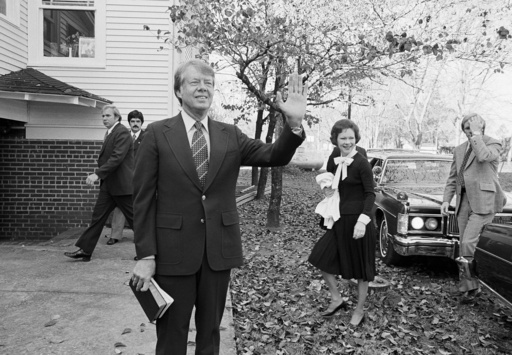PLANS, Ga. — Jimmy Carter, a prominent Southern Baptist politician, had already been under significant media scrutiny while campaigning for the presidency in 1976. During this time, he spoke candidly on topics like sex and sin in an interview with Playboy magazine, aiming to clarify his religious beliefs. However, his intentions were overshadowed by a focus on his comments surrounding “lust” and “adultery,” which were widely misinterpreted and sensationalized by the media.
Now, nearly fifty years later, as he received hospice care in his Georgia home, Robert Scheer, one of the interviewers, reflects on how Carter was misunderstood. Scheer characterized him as a “real” and “serious” person whose insightful comments were drowned out by the pressures of his closing campaign. Carter passed away at the age of 100.
“Jimmy Carter was a thoughtful individual,” Scheer asserted, emphasizing the global reach of the sensationalized narrative that persisted long after the interview. The political aftermath was intense, with public questions being raised about Rosalynn Carter’s trust in her husband, leading to what Carter described as a situation that “nearly cost me the election.”
Carter dedicated over five hours across several months to the Playboy interview, which resulted in a monumental Q&A spanning 12,000 words. Scheer noted that Carter took more time with Playboy than he did with major publications like Time or Newsweek. The breadth of discussion included critical topics such as military and foreign policy, civil rights, and his often-criticized reputation.
“Playboy wasn’t interested in sensationalism,” Scheer remarked. Founded by Hugh Hefner, the magazine presented not only nude photography but also crucial conversations through its “Playboy Interview” series featuring influential figures like Martin Luther King Jr. and John Lennon. Scheer insisted that Carter’s willingness to engage in nuanced discourse positioned him deserving of that platform.
Carter’s remarks that garnered the most attention came towards the end of the interview. When asked if his faith would hinder him from acting as a flexible president, he delivered an eloquent response, discussing human imperfection and divine forgiveness. He assured that he believed in the total separation of church and state, portraying his faith through the lens of humility rather than judgment.
Reciting Matthew 5:27-28, Carter articulated that he was in no place to condemn others because he himself had struggled with lustful thoughts, thus equating them with adultery in the eyes of Christ. Scheer noted this as a reasonable reflection of Carter’s Baptist beliefs, as he expressed that he didn’t wish to come off as overly dogmatic or a perfect figure.
Understanding the potential impact of Carter’s words, Playboy moved swiftly to distribute the interview to about 1,000 media outlets before its scheduled publication, aiming to provide fair coverage ahead of the election. However, the media’s reaction remained sensational. Late-night comedians and cartoonists seized on the opportunity, dubbing the incident the “lust in my heart” interview, with SNL featuring mock sketches that proliferated the narrative.
In a 1993 interview, Carter lamented how the Playboy article overshadowed his campaign’s key messages, expressing frustration over what had become “the No. 1 story of the entire 1976 campaign.” He reflected that he intended to convey a message about moral failings within every individual.
Despite his strong connection with core white evangelicals and cultural conservatives, laying down groundwork for potential conflicts, many urban liberals and younger voters were skeptical of his image, often seeing him as excessively pious. Campaign manager Hamilton Jordan famously referred to Carter’s faith as “the weirdo factor,” indicating their intent to normalize his beliefs by engaging with Playboy.
Scheer, traveling along with Carter’s campaign, recalled the chaotic response of reporters when the Playboy interview unfolded. At the time, reporters were especially keen on Carter’s criticisms of Lyndon Johnson, knowing full well he was set to campaign in Texas alongside LBJ’s widow, leading to complications for the candidate.
Carter, initially claiming his comments had been misrepresented, faced more backlash as the interview’s fallout started to overshadow his candidacy. He insisted that his controversial remarks were made during a casual off-the-record moment, despite having been mic’d at the time.
The rapid evolution of the story unwittingly contributed to a perception of Carter as morally compromised, according to media historian Amber Roessner. Rosalynn Carter offered only good-natured responses about her husband’s inclination to speak his mind, assuring that his honesty was a virtue, never expressing concerns about his loyalty.
Using the controversy to their advantage, President Gerald Ford’s GOP campaign targeted Carter; Ford was more discreet regarding his own faith matters. In the wake of the interview’s release, he publicly announced his decision to decline similar engagements with Playboy, which resonated with his constituents, as evangelical leaders condemned Carter’s remarks.
The backlash also included critiques from renowned religious figures like Billy Graham, who quickly rallied public opinion against Carter. Roessner noted, however, that many leading ministers should have recognized the context of Carter’s comments.
Carter eventually revealed his lingering frustration at the media landscape, explaining that the distrust of politicians prevalent at the time contributed to the escalating scrutiny he faced. “The traveling press has zero interest in any issue unless it’s a matter of making a mistake,” he observed.
Scheer, who was present during the campaign, expressed that despite the overwhelming commentary surrounding Carter’s statements, they eventually played a role in his narrow electoral triumph weeks later. In retrospect, Scheer voiced his belief that the media frenzy achieved the outcome it likely intended, as Carter’s legacy continued to grapple with the hysteria surrounding the infamous Playboy interview.



